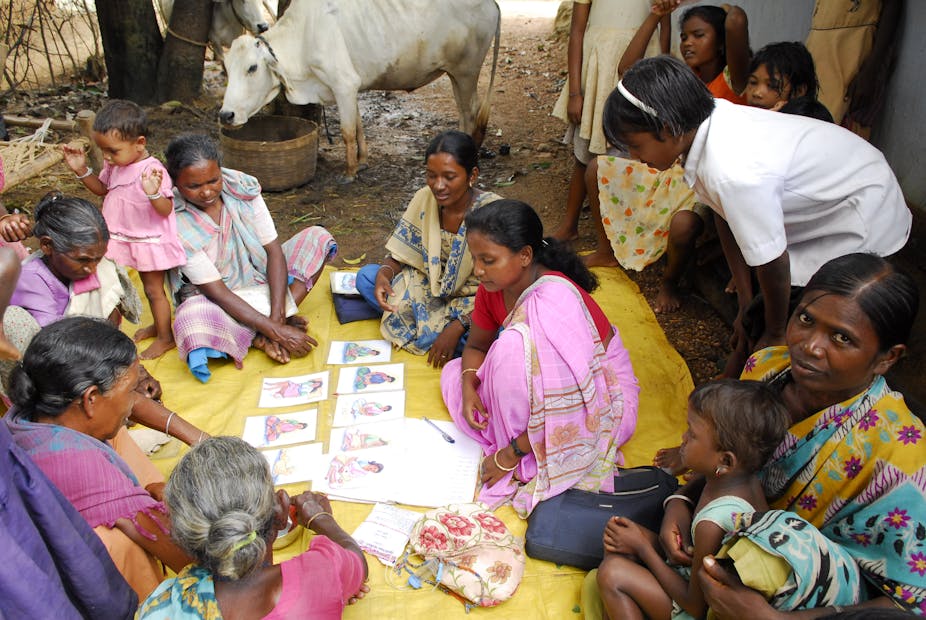Gadagadei village, in the state of Odisha, is inhabited by Juangs, one of a number of tribal groups in India that are counted as being particularly vulnerable. It is remote, surrounded by forests, and has poor communication and transport links. With limited access to services, Gadagadei village – and many others like it – has suffered the death of newborns and mothers who might otherwise have been saved.
Not all strategies to prevent newborn deaths have to be high-tech. Community interventions that promote simple preventive practises and encourage families to seek treatment at the right time are just as important. Early and exclusive breastfeeding, keeping babies warm, and taking prompt action when faced with a health problem, for example, can make all the difference. Postnatal home visits and participatory women’s groups have been so successful in cutting maternal and newborn deaths that they are being recognised in the World Health Organisation and Unicef’s Every Newborn Action Plan, which renews commitment to reducing newborn deaths and stillbirths.
New impetus is certainly needed: 2.9m newborns die every year, another 2.6m are stillborn, and 289,000 women die annually from complications of pregnancy and childbirth. Most of these deaths occur in low and middle-income countries and, crucially, most can be prevented. Progress has been steady but slow: mortality in children under five fell by almost a half between 1990 and 2012, while mortality in newborn infants fell by 37%. And many of these deaths occur among the poorest families in rural settings like Gadagadei.
A series of studies in India, Bangladesh, Pakistan and Ghana have shown that postnatal visits can reduce neonatal mortality by supporting families to adopt essential newborn care practices and linking them with health facilities when required. And Gadagadei village was one of the villages included in a randomised controlled trial of participatory women’s groups led by Ekjut (in India) in partnership with University College London.
These groups involve a cycle of meetings supported by a female facilitator, in which women identify and prioritise common maternal and newborn health problems, decide on locally appropriate strategies, before putting them into action and then evaluating the results. In the case of Gadagadei, maternal malaria and low birth weight were two key problems facing the mothers and babies.
Once they had identified these problems, they mobilised the community to fill in small bodies of stagnating water where mosquitoes could breed, and conducted peer education to encourage community members to sleep under bed nets. They created a childbirth fund to pay for transport and treatment in the event of an emergency, such as when a woman became infected with malaria. They established a village drug depot, so that group members and other women could access drugs to prevent malaria, and other drugs such as iron tablets and oral re-hydration solution, to address its consequences.
The group also recognised the role of nutrition in preventing the birth of small babies and ensuring good growth. Members established a collective kitchen garden, where they grew seasonal fruits and vegetables for consumption by pregnant women and new mothers. Men also began attending the women’s group meetings. This led them to understand that pregnancy and childbirth were not necessarily only women’s concerns, and to them showing their support by volunteering to perform in a street play about the issue to the entire village and outside visitors.
Initially women in the Gadagadei village group didn’t show much interest in attending because they were busy with daily chores. Discussions about mother and child health were thought unimportant because problems in pregnancy and childbirth are considered routine. But eventually, they began to realise just how many lives could have been saved.
Through collective problem-solving and action, these types of groups have been able to bring down newborn deaths in Gadagadei and many other villages, showing that women are not just passive recipients of health messages, but that their active engagement can make a real difference to survival.
This is backed by research conducted by a number of organisations linked here and over the past decade in places including Nepal, Mumbai, Bangladesh, and Malawi. This has shown that in rural areas where more than 30% of pregnant women attended group meetings, newborn deaths fell by 33% and maternal deaths by 49%.
UCL research estimates that with at least 30% of pregnant women participating, such groups could prevent an estimated 36,600 maternal deaths and 283,000 newborn deaths if scaled up in countries with medium to high mortality rates. Reaching every mother and every newborn starts with a plan, and women must be at the centre of it.
Thanks to Suchitra Rath and Nirmala Nair (Ekjut) for sharing the story of Gadagadai village. The research described in this article was led by the Perinatal Care Project (Bangladesh), MIRA (Nepal), Ekjut (India), SNEHA (Mumbai, India), MaiMwana and PACHI (Malawi), in collaboration with UCL.

